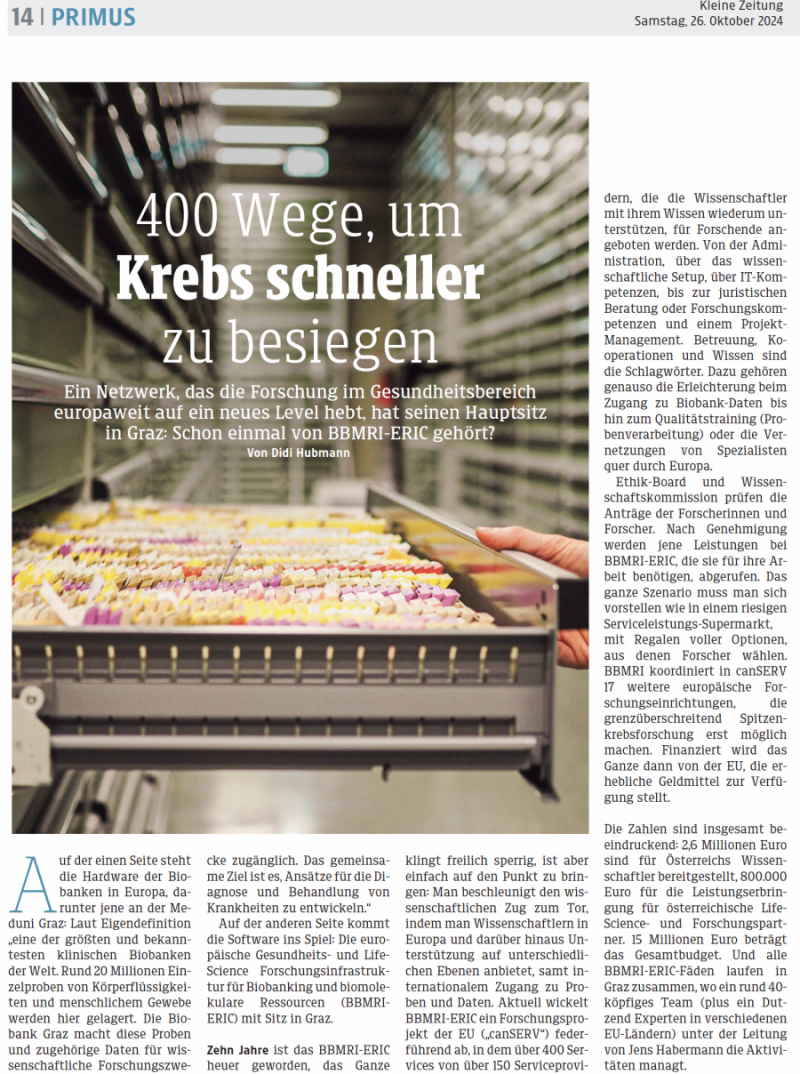I am looking for information as
Researcher

Industry

Patient

BBMRI-ERIC and canSERV in the press: 400 ways to defeat cancer faster
The following article is 704 words and a five-minute read.
Thank you to Didi Hubmann, Editorial Director of Themenmagazine, Kleine Zeitung, for granting permission to share his translated feature on BBMRI-ERIC and the canSERV project.
You can access the original German versions as they appeared in print as a PDF – page one and page two.
400 ways to defeat cancer faster
A network that brings research in the European health sector to a new level, has its headquarters in Graz: Ever heard of BBMRI-ERIC?
By Didi Hubmann
Kleine Zeitung, Oct 26, 2024
On the one hand, we have the hardware of the biobanks in Europe including the one located at the Med Uni Graz, according to its own definition “one of the largest and best-known clinical biobanks worldwide. Around 20 million individual samples of body fluids and human tissues are stored here. Biobank Graz makes these samples and associated data accessible for scientific research. The common goal is to develop approaches for the diagnosis and treatment of diseases.”
On the other hand, the software comes into play: The European Health and Life Science Research Infrastructure for Biobanking and Biomolecular Resources (BBMRI-ERIC) with its headquarters located in Graz. The name may sound bulky, but to put it simply: you accelerate the scientific drive towards the goal by supporting scientists in Europe and beyond at different levels, including trans-national access to samples and data.
Currently, BBMRI-ERIC is leading an EU research project (“canSERV”) in which over 400 services from 150 service providers are made accessible to scientists across Europe. The services range from administration, to the scientific set up, IT skills, legal consulting or research skills and project management and the unifying keywords are: support, cooperation and knowledge. The services also include easier access to biobank data, quality training (e.g. sample processing) and networking of specialists across Europe.
The whole scenario resembles a huge service supermarket with shelves packed with high-quality options, from which researchers can choose the needed services for their research projects. All applications from researchers to access these services are examined by an Ethics Board and Scientific Commission. After approval, the granted services are provided free of charge via BBMRI-ERIC.
In the canSERV project, BBMRI coordinates the activities of 17 other European research institutions, which together make cross-border cancer research at the highest level possible. The project is funded by the EU which provides considerable financial resources. The figures alone are impressive: From a total budget of 15 million Euro, 2.6 million Euro are provided for Austria’s scientists and 800,000 Euro for the provision of services for Austrian life science and research partners. And everything is connected through BBMRI-ERIC’s headquarters in Graz, where a team of 40 experts (complemented by a dozen experts located in various EU countries) coordinate the activities under the leadership of Prof. Jens Habermann, BBMRI-ERIC’s Director General.
One main focus is the fight against cancer. In total, samples and data of 21 different tumour entities build the foundation for various research projects. It is one of the highest priorities for BBMRI-ERIC that the results of all these different projects are shared with the public to further accelerate research. The Med Uni Graz is an integral part of these efforts and specialises in the development of AI algorithms in digital pathology as well as the isolation and preservation of cancer cells.
International success stories highlight the impact of BBMRI-ERIC’s and canSERV’s model to support research. One successful canSERV applicant is Dr. Julia Scheiermann, assistant physician for paediatric oncology and haematology at the Charité University Hospital Berlin. Scheiermann’s research is driven by the question how the composition of a cancer patient’s intestinal microbiome influences the success rate of stem cell transplants. Bone marrow transplants can be key to cure severe diseases including cancer, but still bare high risks in form of relapses or infections. Scheiermann’s research therefore aims to develop strategies to support the patient’s intestinal microbiome and reduce the risk of serious complications after transplantation.
Via BBMRI-ERIC and canSERV, Julia Scheiermann is able to access state-of-the-art genome sequencing services at the University of Bologna to analyse her patients’ samples and she can also complete special quality management training in the field of biobanking. All this is part of canSERV’s vast service portfolio to support researchers on their way to new breakthroughs.






